|
|
|
Sort Order |
|
|
|
Items / Page
|
|
|
|
|
|
|
| Srl | Item |
| 1 |
ID:
193299
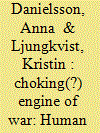

|
|
|
|
|
| Summary/Abstract |
This article explores the question of human agency in military targeting. Targeting is one of the key drivers of war. When studied by academic disciplines, much interest has been devoted to the ethics and effects of military targeting. Less debated, but focused here, is the question of the conditions of human agency within military targeting. In the literature that does exist on this topic, there is a questioning of the traditional conception of human agency but at the same time a lack of closer conceptualisation of different kinds of articulations of human agency in the targeting process. In this article, we propose a recentring of human agency in critical scholarship on military targeting. With inspiration from Theodore Schatzki's work on ‘practice’, by analytically approaching targeting as a practice, and through various examples from Operation Iraqi Freedom, the article develops and illustrates a framework for the conceptualisation of human agencies in targeting. This framework distinguishes articulations of agency based on whether they furthered the (temporary) ordering of the targeting practice or challenged its internal organising elements. The study of military targeting is significant not least since the phenomenon is one of the key ‘engines’ and drivers of war's constant becoming.
|
|
|
|
|
|
|
|
|
|
|
|
|
|
|
|
| 2 |
ID:
193297


|
|
|
|
|
| Summary/Abstract |
The term disruption has become a buzzword for our times, although there is little clarity over what the term means, how it is deployed, and towards what ends. In order to understand the analytical and political stakes that are embedded in the deployment of ‘disruption’ as a rationale for various sources of upheaval, in this article I argue that these three terrains of disruption should be understood as theories of governance, and term them ‘disruption from above’, ‘disruption from the middle’, and ‘disruption from below’. Each terrain of disruption embodies different ethoses, actors, and goals: the first connoting elite-driven creative destruction and innovation; the second obfuscating the capitalist imperative that produces world-systemic upheavals; and the third seeking to expose the structures of violence and inequality built into such practices. I illustrate these three terrains through a structural account that traces the popularity of the disruption discourse from its origins to its material application; analyse an illustrative example of the assetisation of infrastructure and how it bureaucratises governance and shifts relations of power; and conclude by examining infrastructural forms of protest against such forms. I argue that the confusion over what disruption means, who exercises it, and upon whom is not a coincidence: rather, disruption's polysemy is structurally produced as a way to disguise ongoing capitalist crisis as a technical problem that market innovations can solve.
|
|
|
|
|
|
|
|
|
|
|
|
|
|
|
|
| 3 |
ID:
193301
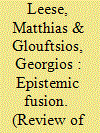

|
|
|
|
|
| Summary/Abstract |
This article focuses on the control of international mobility through the gathering, processing, and sharing of air travellers’ data. While a lot has been written about pre-emptive rationalities of security translated into the functionalities of IT systems used for border controls, we take a step further and investigate how these rationalities are operationalised through data transfer, screening, validation, discarding, profiling, contextualisation, calibration, and adjustment practices. These practices may seem banal and technical; however, we demonstrate how they matter politically as they underpin the making of international security. We do so by analysing the work of Passenger Information Units (PIUs) and retracing how they turn Passenger Name Record (PNR) data into actionable intelligence for counterterrorism and the fight against serious crime. To better understand the work of PIUs, we introduce and unpack the concept of ‘epistemic fusion’. This explicates how security intelligence comes into being through practices that pertain to cross-domain data frictions, the contextualisation of data-driven knowledge through its synthesis with more traditional forms of investigatory knowledge and expertise, and the adjustment of the intelligence produced to make it actionable on the ground.
|
|
|
|
|
|
|
|
|
|
|
|
|
|
|
|
| 4 |
ID:
193303
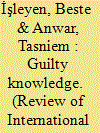

|
|
|
|
|
| Summary/Abstract |
This article studies practices of knowledge production during counterterrorism financing court cases in European courts. Developments in international law have contributed to novel regulations to criminalise and prosecute the funding of terrorism in advance of terrorist violence. In this study, we study how court cases have become important spaces for contesting and evaluating multiple knowledge claims on terrorist threat and suspicion by analysing case proceedings from both the Netherlands and the United Kingdom. Building on recent debates in International Relations and postcolonial theory, we make two contributions. First, building on insights from postcolonial literature on ‘abyssal thinking’, we illustrate how legal practices differentiate between different ways of knowing by dismissing certain experiences as ‘emotional’ or ‘subjective’ in contrast to the assumed objectivity of other knowledge claims. We argue that decisions on what counts as knowledge in a court setting are situated in a specific sociopolitical setting, whereby particular knowledge and life-worlds are recognised at the expense of others. Second, we empirically show how the novel criminal laws shifts the responsibility to know terrorist threat from the state to ordinary citizens. We illustrate how the court reinforces new security logics where the state can entertain doubt, uncertainty, and trust in their practices, while the citizens cannot.
|
|
|
|
|
|
|
|
|
|
|
|
|
|
|
|
| 5 |
ID:
193296
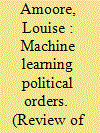

|
|
|
|
|
| Summary/Abstract |
A significant set of epistemic and political transformations are taking place as states and societies begin to understand themselves and their problems through the paradigm of deep neural network algorithms. A machine learning political order does not merely change the political technologies of governance, but is itself a reordering of politics, of what the political can be. When algorithmic systems reduce the pluridimensionality of politics to the output of a model, they simultaneously foreclose the potential for other political claims to be made and alternative political projects to be built. More than this foreclosure, a machine learning political order actively profits and learns from the fracturing of communities and the destabilising of democratic rights. The transformation from rules-based algorithms to deep learning models has paralleled the undoing of rules-based social and international orders – from the use of machine learning in the campaigns of the UK EU referendum, to the trialling of algorithmic immigration and welfare systems, and the use of deep learning in the COVID-19 pandemic – with political problems becoming reconfigured as machine learning problems. Machine learning political orders decouple their attributes, features and clusters from underlying social values, no longer tethered to notions of good governance or a good society, but searching instead for the optimal function of abstract representations of data.
|
|
|
|
|
|
|
|
|
|
|
|
|
|
|
|
| 6 |
ID:
193298
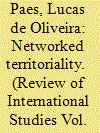

|
|
|
|
|
| Summary/Abstract |
This article proposes a processual–relational perspective on region-making and its effects in world politics. It revisits the concepts of regionalism and regionalisation to unearth the relational mechanisms underlying these archetypical pathways of regional emergence. Regionalism refers to the bounding of regions – the definition of its inside and outside, and of which actors fall on either side. Regionalisation denotes the binding of regions, the amalgamations of relations around a shared territoriality. I argue that regions affect world politics in their making through the boundaries raised and relations produced in the process. I then mobilise network theory and analysis to propose a framework for studying the making and makings of regions. Regions’ binding and bounding are rooted in brokerage dynamics that sustain clusters of relations denser inside a regional boundary, rather than outside, and allow some actors to control interactions across that boundary. I illustrate this framework with a case study on the emergence of the Amazon as a region in world politics. I analyse interaction networks in UN-level environmental negotiations involving the ecosystem. The analysis shows how the making of the Amazon has been tied to preserving the position of Amazonian states as the main brokers, speaking for and acting on behalf of the region.
|
|
|
|
|
|
|
|
|
|
|
|
|
|
|
|
| 7 |
ID:
193300
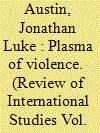

|
|
|
|
|
| Summary/Abstract |
How do people know how – very practically speaking – to be violent? This article explores that question through a Science and Technology Studies perspective. It does so in order to go beyond the usual location of global political violence at a structural level that attributes its emergence principally to hierarchical orders, formal training, or deep cultural, political, or ideological factors. The alternative explanation offered here draws on Bruno Latour's concept of ‘plasma’ to sketch a theory of how practices of violence are embedded at a distributed ontological level through the historical accumulation of (popular) cultural, textual, technological, and other epistemic objects. In making that claim, I seek to stress how violent knowledge circulates outside the formal domains associated with it (the military, police) and is instead preconsciously accessible to each and every person. To support this argument, the article draws on empirical examples of the use of torture, including interviews conducted with Syrian perpetrators of torture, as well as by tracing the paradoxical entanglements between scientific practice and the practice of torture. I conclude by engaging the field of preventive medicine to speculate on the need to develop modes of violence prevention that appreciate political violence as a population-level sociopolitical problem.
|
|
|
|
|
|
|
|
|
|
|
|
|
|
|
|
| 8 |
ID:
193295
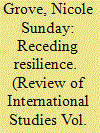

|
|
|
|
|
| Summary/Abstract |
The term disruption has been offered as both an ethos and set of practices framed as a broad response to all manner of social and political ills. This article offers a speculative reflection on disruption as a planetary mood, and the sensory qualities of a change in politics no longer defined by governance and what is governable, but by a series of continuous experiments hedged upon the creation of new geopolitical frontiers and life forms that position all matter and contingency towards a specific kind of value tied to chaos. In thinking about the kinds of authority and legitimacy being fashioned around visions of so-called disruptive futures, I draw on materially-grounded illustrations of disruptive dispositions to examine three different arrangements of affect, feeling, and intensity being animated to give disruption its power of transmissibility and adaptability, as well as its unintuitive emphasis on disorder and ‘breaking things’ as both a moral good and unconditional response to questions concerning global conflict, crises, and instability. Ultimately, disruption as a planetary mood draws on a libidinal economy that does not bend towards justice or equity, thus warning against misanthropic commitments to collapse and the consequences of investing in a world premised on an ethos of erasure.
|
|
|
|
|
|
|
|
|
|
|
|
|
|
|
|
| 9 |
ID:
193302
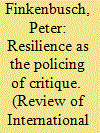

|
|
|
|
|
| Summary/Abstract |
This article offers a critical review of the main conceptual readings of resilience as a prominent policy paradigm in international development, security, and disaster management. Focusing on neoliberal, biopolitical, cybernetic, and postliberal understandings, it probes the possibilities for engaging in a socially transformative critique of resilience. In particular, the article asks how the resilience discourse polices critique in a way that includes certain forms of knowledge, such as indigenous, local, and everyday knowledge, while excluding abstract theorising. What is considered authoritative knowledge in the resilience discourse? And what are the possibilities for opposing resilience if it ‘metabolizes critique into its internal dynamic’, as Jeremy Walker and Melinda Cooper famously argued? How does critique turn from a tool to undermine dominant knowledge-power regimes into a motor of governance? The article demonstrates that the more seriously we engage with the underlying ontology of resilience, the more difficult it becomes to formulate a critique that is not incorporated into governance. As a possible way forward, the article discusses Luc Boltanski's pragmatist sociology of critique.
|
|
|
|
|
|
|
|
|
|
|
|
|
|
|
|
|
|
|
|
|